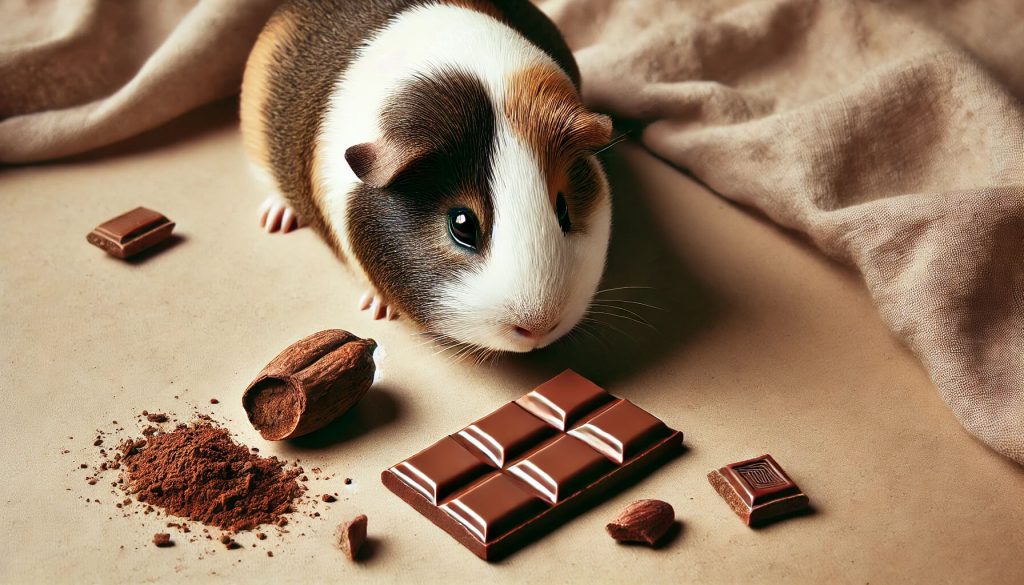
Can Guinea Pigs Eat Cacao?
Nutritional Profile of Cacao
Cacao offers myriad health benefits for humans, but its suitability for guinea pigs are debatable due to its unique nutritional components.
Benefits of Cacao for Humans
Cacao contains antioxidants, flavonoids, and essential minerals like magnesium and iron. These compounds enhance cardiovascular health and improve mood through the release of endorphins and serotonin. In humans, regular consumption of cacao can lead to better cognitive function and reduced inflammation.
Potential Risks in Cacao
Cacao is rich in theobromine and caffeine, alkaloids that can be toxic to guinea pigs. These substances can cause severe health issues like increased heart rate, tremors, and digestive problems. Guinea pigs have sensitive systems, making even small amounts of cacao potentially dangerous. Additionally, cacao’s high-fat content is unsuitable for guinea pigs, contributing to obesity and related health issues.
Guinea Pigs Dietary Requirements
Guinea pigs need specific nutrition to stay healthy. A balanced diet is crucial for their well-being and longevity.
Safe Foods for Guinea Pigs
- Hay: Timothy hay provides fiber for digestion and essential nutrient absorption.
- Vegetables: Offer bell peppers, cucumbers, and leafy greens like romaine lettuce and spinach.
- Fruits: Serve small portions of apples, strawberries, and blueberries as occasional treats.
- Pellets: Use specially formulated guinea pig pellets rich in vitamin C.
- Cacao: Theobromine and caffeine in cacao cause severe heart and digestive issues.
- Onions & Garlic: These can cause toxicity and lead to severe health problems.
- Potatoes: High in solanine, which is toxic to guinea pigs.
- Dairy Products: Guinea pigs can’t digest lactose, leading to gastrointestinal issues.
Always consult with a vet to ensure your pet’s diet is safe and nutrient-rich.
Effects of Cacao on Guinea Pigs
Theobromine Toxicity in Animals
Cacao contains theobromine, which guinea pigs struggle to metabolize effectively. It remains in their systems longer, causing adverse effects. While theobromine provides benefits like heart stimulation for humans, it’s toxic for guinea pigs. Metabolic imbalance results from it, posing severe health risks. Cases show that the amount present in a small piece of chocolate can be lethal for small pets, including guinea pigs.
Symptoms of Poisoning in Guinea Pigs
Guinea pigs that consume cacao may exhibit symptoms of poisoning. Common signs include hyperactivity and restlessness. As toxicity progresses, you may notice increased heart rates and seizures. Digestive issues such as diarrhea and abdominal pain often occur. Guinea pigs with severe poisoning may also experience muscle tremors or even death. Prompt veterinary care is critical if your pet shows any signs of these symptoms after cacao consumption.
Safer Alternatives to Cacao for Guinea Pigs
Offering your guinea pig the right diet ensures its health and happiness. While cacao poses risks, many safe alternatives delight your pet and provide essential nutrients.
Recommended Treats and Foods
Include fresh vegetables and fruits to vary your guinea pig’s diet. Carrots, bell peppers, and cucumbers offer crunch and vitamins. Serve dark leafy greens like kale and romaine lettuce in moderate amounts to avoid calcium imbalance. Choose fruits like apples and strawberries occasionally; they’re sweet treats but should be given in small portions due to their sugar content.
Commercial treats designed for guinea pigs, such as hay-based snacks, can supplement fresh produce. These treats provide necessary fiber for digestion. Guinea pig pellets fortified with vitamin C ensure they get essential nutrients.
Foods to Avoid
Avoid foods that can harm your guinea pig. Never feed chocolate, caffeine products, or human snacks; these contain harmful compounds. Steer clear of starchy vegetables like potatoes which are not digestible for guinea pigs. Onions and garlic are toxic and can cause health issues. High-fat or high-sugar foods disrupt their digestive system and overall health.
Focus on providing balanced, species-specific diets to maintain your guinea pig’s well-being and ensure long, healthy lives.
Conclusion
Feeding cacao to guinea pigs poses significant health risks due to theobromine toxicity. Always opt for safer alternatives like fresh vegetables, fruits, hay-based snacks, and fortified pellets. Avoid harmful foods such as chocolate, caffeine, starchy vegetables, onions, and garlic to ensure your guinea pig’s well-being. Prioritizing a balanced, species-specific diet is key to maintaining your furry friend’s health and longevity.
